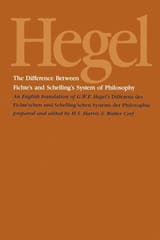Search Results
7/3/2025, 10:31:21 PM
"The foundation of Fichte's system is intellectual intuition, pure thinking of itself, pure selfconsciousness, Ego=Ego, I am... For the philosopher, this pure consciousness originates because he abstracts in his thinking from all the extraneous things... and holds on only to the connection of subject and object. In empirical intuition, subject and object are opposites; the philosopher apprehends the activity of intuiting, he intuits intuiting, and thus conceives it as an identity."
Here it is folks, the πρῶτον ψεῦδος of every rubbish Fichte interpretation. Hegel thinks the absolute of the 94/95 Foundation is the constructed empirical intuition when it is actually Reason as such. This is a grave mistake which spoils his entire "refutation". Note, too, that he thinks the 'object' of the subject-object is the not-I, when it is in fact the real, objective I. The not-I has no standing in Fichte's system, it is something produced in response to limitation. Hegel sees the second and third foundational principles and thinks they are acts 'emanating' from the 'pure I' when they are actually antinomies to be analyzed. Fichte does not even refer to them in his later presentations - they are merely an accident of the form of the first, published Wissenschaftslehre, in which Fichte is emulating Reinhold. Note, too, that he considers the subject-object to be an activity of thinking even though Fichte understands that thinking is not primary. The first principle is a cipher=0, as Fichte says in Part 3 - we can't even think it. And the principle of empirical consciousness is, not thinking, but the will, the real-ideal. Another serious blooper.
"Philosophy is to suspend pure consciousness as concept. When it is placed in opposition to empirical consciousness, intellectual intuition, the pure thinking of itself, appears as concept, that is to say, it appears as an abstraction from the whole manifold, from all inequality of subject and object."
Pure consciousness is not an abstraction, it is an end. I can't believe that (some, not all) scholars use this text, and others like it, to inform their reading of Fichte when it's fundamentally wrong on the most important points right from the start.
Here it is folks, the πρῶτον ψεῦδος of every rubbish Fichte interpretation. Hegel thinks the absolute of the 94/95 Foundation is the constructed empirical intuition when it is actually Reason as such. This is a grave mistake which spoils his entire "refutation". Note, too, that he thinks the 'object' of the subject-object is the not-I, when it is in fact the real, objective I. The not-I has no standing in Fichte's system, it is something produced in response to limitation. Hegel sees the second and third foundational principles and thinks they are acts 'emanating' from the 'pure I' when they are actually antinomies to be analyzed. Fichte does not even refer to them in his later presentations - they are merely an accident of the form of the first, published Wissenschaftslehre, in which Fichte is emulating Reinhold. Note, too, that he considers the subject-object to be an activity of thinking even though Fichte understands that thinking is not primary. The first principle is a cipher=0, as Fichte says in Part 3 - we can't even think it. And the principle of empirical consciousness is, not thinking, but the will, the real-ideal. Another serious blooper.
"Philosophy is to suspend pure consciousness as concept. When it is placed in opposition to empirical consciousness, intellectual intuition, the pure thinking of itself, appears as concept, that is to say, it appears as an abstraction from the whole manifold, from all inequality of subject and object."
Pure consciousness is not an abstraction, it is an end. I can't believe that (some, not all) scholars use this text, and others like it, to inform their reading of Fichte when it's fundamentally wrong on the most important points right from the start.
Page 1
